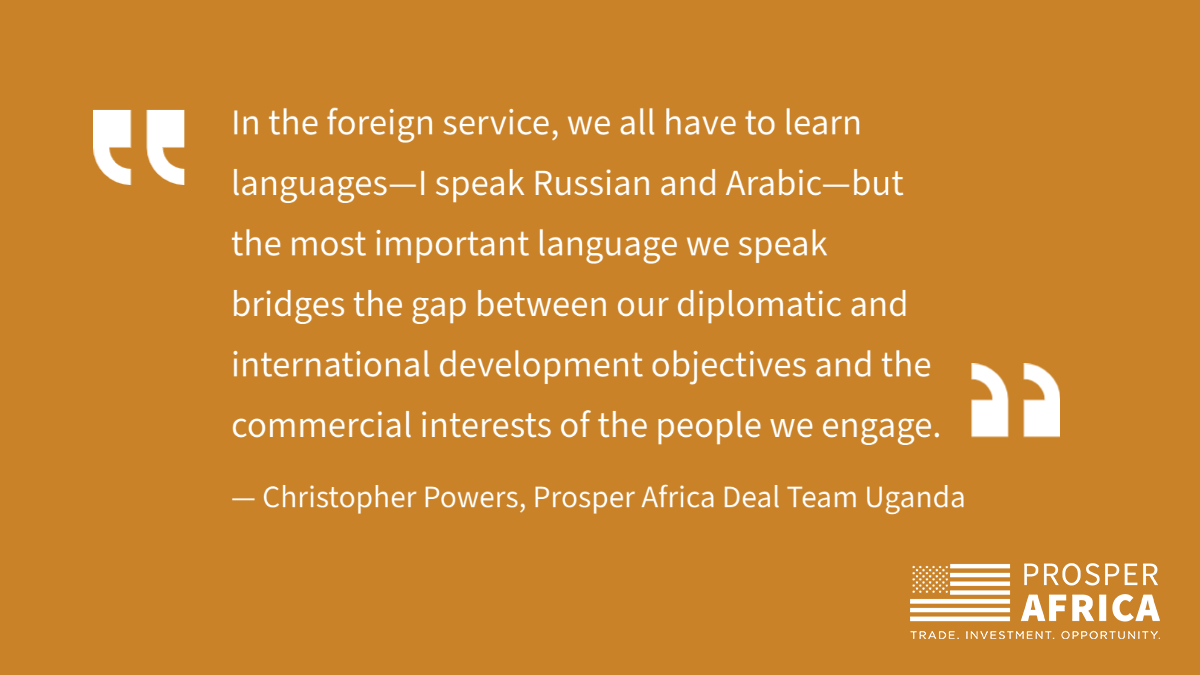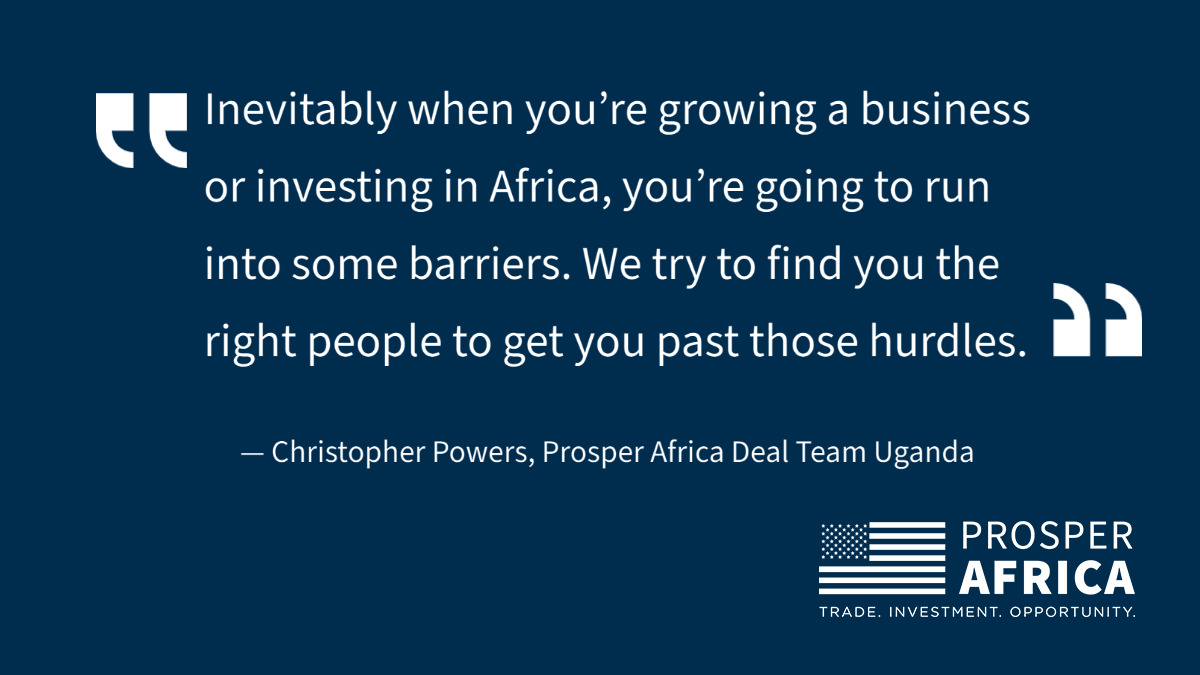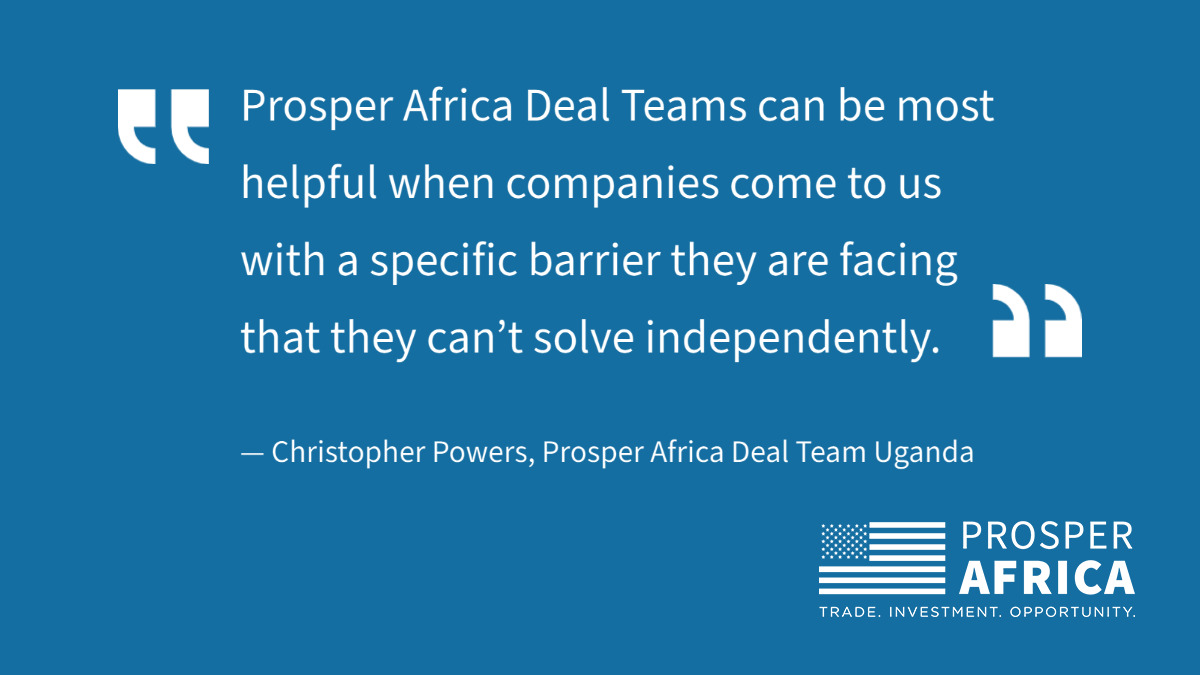Unlocking Business Opportunities: An Interview with Uganda’s Prosper Africa Deal Team
There are many opportunities for companies and investors that want to do business between Africa and the United States. But there are also hurdles to clear – some predictable, some unexpected.
Prosper Africa – a U.S. Government initiative to increase two-way trade and investment between Africa and the United States – can help. Prosper Africa Deal Teams at U.S. embassies across Africa stand at the ready. Under the leadership of U.S. ambassadors, Deal Teams draw on the full range of U.S. Government resources to help African and American companies identify deals and bring them to close.

In the interview below, two U.S. Government officials from the Prosper Africa Deal Team in Uganda share their experience connecting businesses with the resources they need. Mark Krumm, an Economic and Commercial Specialist at the U.S. Embassy in Kampala, Uganda, had a career in startups and corporate finance before he joined the U.S. Government. Christopher Powers, Deputy Director for the Economic Growth Office at the U.S. Agency for International Development’s Mission in Uganda, spent a decade in the investment arena. Now, as part of the Prosper Africa Deal Team in Uganda, the two work together to help American companies enter and expand in Ugandan markets and help Ugandan companies connect with American investors.
The following interview has been edited for length and clarity.

What is a Prosper Africa Deal Team and what do you offer in Uganda?
Christopher Powers: Inevitably when you’re growing a business or investing in new markets, you’re going to run into some barriers. We try to find you the right people to get you past those hurdles—to figure out how the U.S. Government can help. Prosper Africa Deal Teams provide a platform and a venue where we can circle the wagons and bring in the right Federal agency.
Mark Krumm: We usually start with a quick conversation to isolate your problem. Then we think about who is best placed to help—whether in the Department of Commerce, or Defense, or the Trade and Development Agency, or the Development Finance Corporation—to move the potential initiative forward.
Powers: For example, there was a farm processor with a million dollars’ worth of red peppers that he wanted to export. He just couldn’t get the right attention for the permitting and he couldn’t get the approvals. He needed someone with a relationship with the U.S. Embassy to flag this $1 million export for him. Sometimes you just need to get on the right government official’s radar, but businesses may not have those contacts. That’s a place where we can help.

How does this work in practice?
Krumm: One example is some work we did with Loon, which is part of Alphabet and a spinoff of Google X. Loon brings connectivity to underserved communities via balloons that launch from Puerto Rico and Nevada. The company wanted to access the market in Kenya, but their balloons needed to float across Africa. So Loon needed to secure overflight permission in Uganda. Through our contacts with Uganda’s Ministry of Defense, the Ministry of Information and Communications Technology, and the Civil Aviation Authority, we were able to have meetings all the way up to the President of Uganda to convince everyone that this would be good for Uganda—and that eventually, Loon could provide connectivity to poor and rural areas of Uganda too. In December, Loon signed an agreement with the Uganda Civil Aviation Authority. People in rural Uganda are going to be left behind if they don’t have that connectivity. So that was a win-win for everybody.

Powers: Another is the American-Ugandan company Agilis. Today it is a leading wholesaler of grains and pulses sourced from smallholder farmers and it has its own 13,500-acre commercial farm as well. They are probably one of the largest U.S. investors in Uganda, but they started out very small. They received support from the U.S. Government at a few key points. They received some USAID funding a while back, and they won the State Department’s Corporate Excellence Award in 2019, which is really notable. Prosper Africa provided some strategic support to strengthen the business via an investment advisory firm, and USAID Uganda is helping them with a capital raise, to connect them to the right investors from the U.S. This is something that benefits smallholder farmers and benefits Uganda, so it’s really a case where their commercial objectives overlap with USAID’s development objectives.
Krumm: I can’t tell you that everything has been perfectly smooth for Agilis along the way. But we’ve been able to leverage our contacts and relationships when Agilis has run into problems or when they needed help with a fund raise or with introductions around a community.

When should companies reach out to Deal Teams for help?
Powers: Prosper Africa Deal Teams can be most helpful when companies come to us with a specific barrier they are facing that they can’t solve independently. Our top priority tends to be deals that are close to an investment but just need a final push, especially if by removing those obstacles we could facilitate a significant investment. For example, if an African company were ready to raise investment capital and had an investor circling a deal, but they just weren’t able to close it, that might be a place where we could help.

Any last thoughts?
Powers: In the foreign service, we all have to learn languages—I speak Russian and Arabic—but the most important language we speak bridges the gap between our diplomatic and international development objectives and the commercial interests of the people we engage. That language, that ability to translate and bridge the gaps, understanding what businesses need commercially and linking it to what we offer as the U.S. Government in-country, is one of our greatest strengths.
Prosper Africa can connect you with embassy deal teams across the African continent at prosperafrica@usaid.gov.
Fellowship Alumni and selected candidates for 2021 who are interested in learning more about this topic are encouraged to take the Opportunities and Strategies to Promote Partnerships with U.S. Businesses course through the Fellowship Portal. Learn more about the courses.